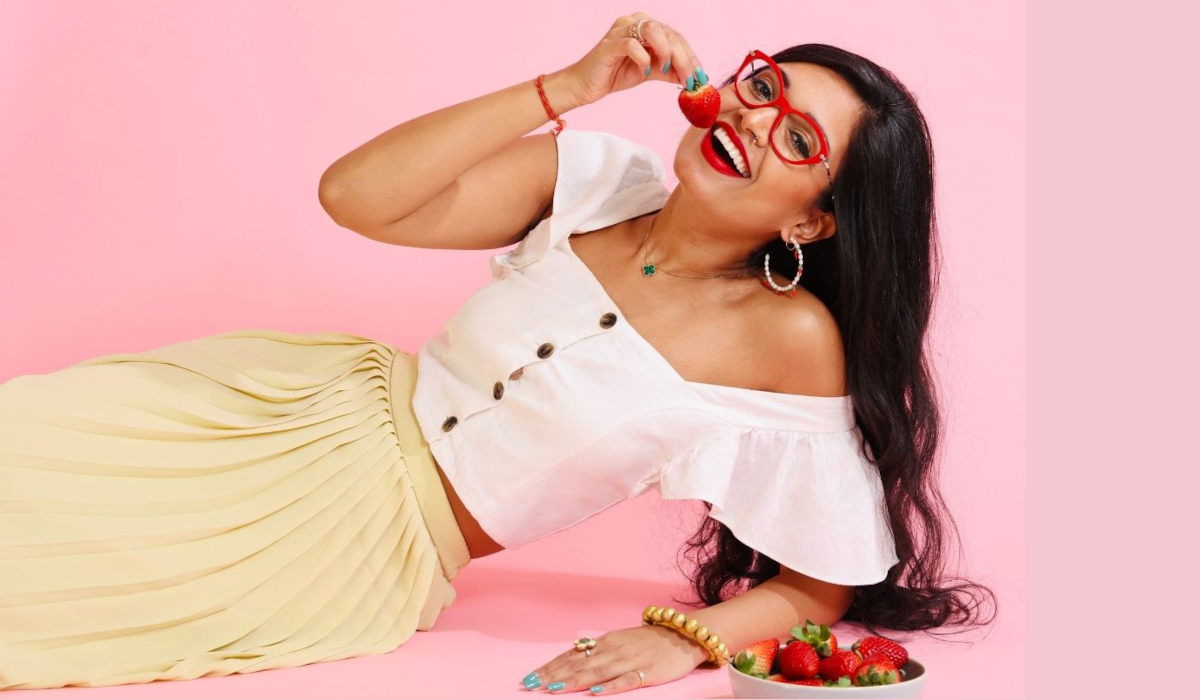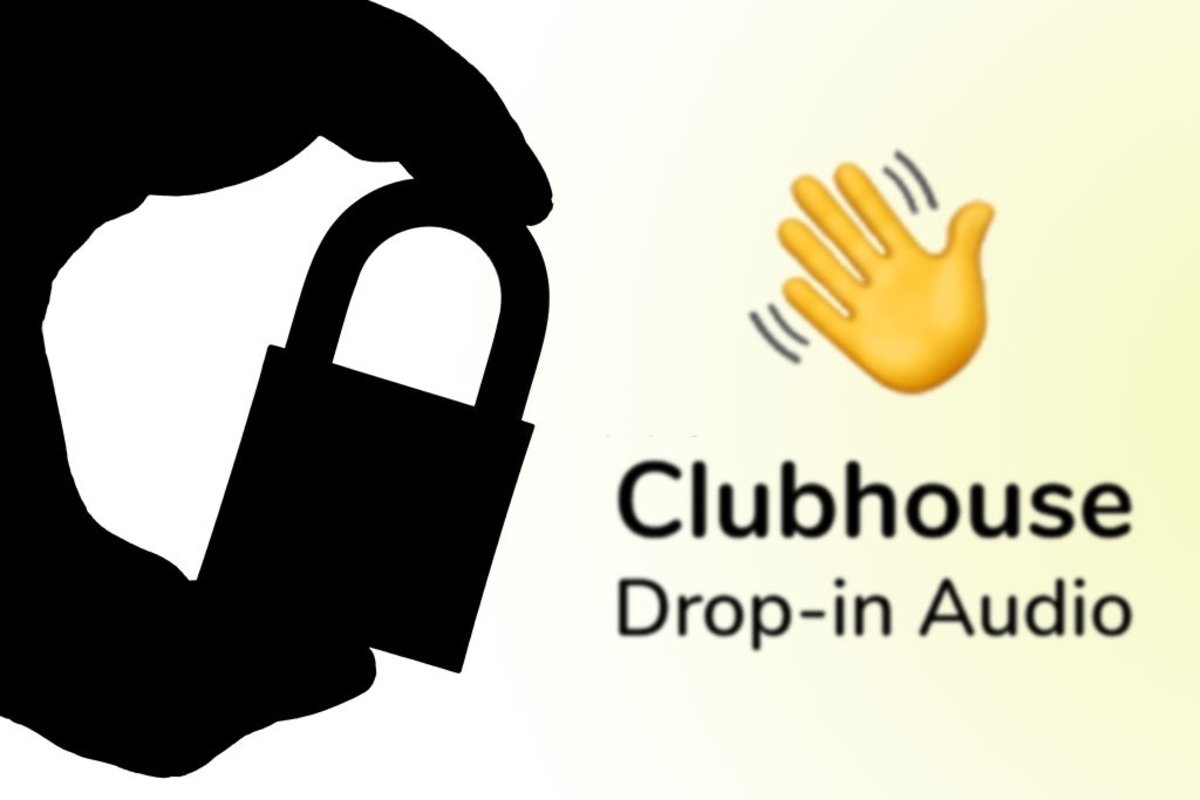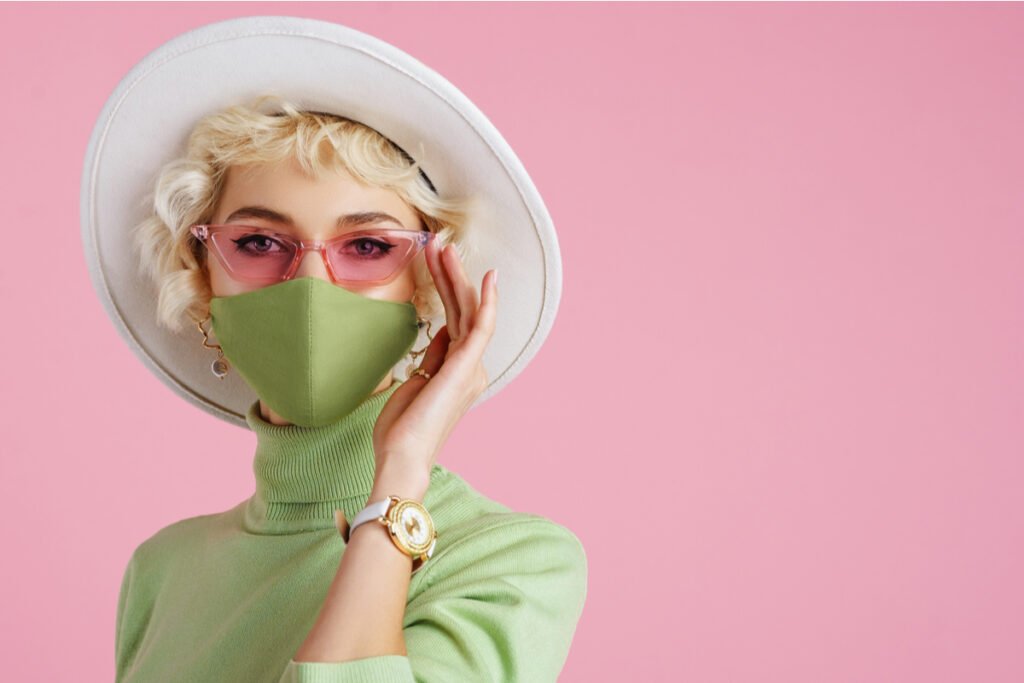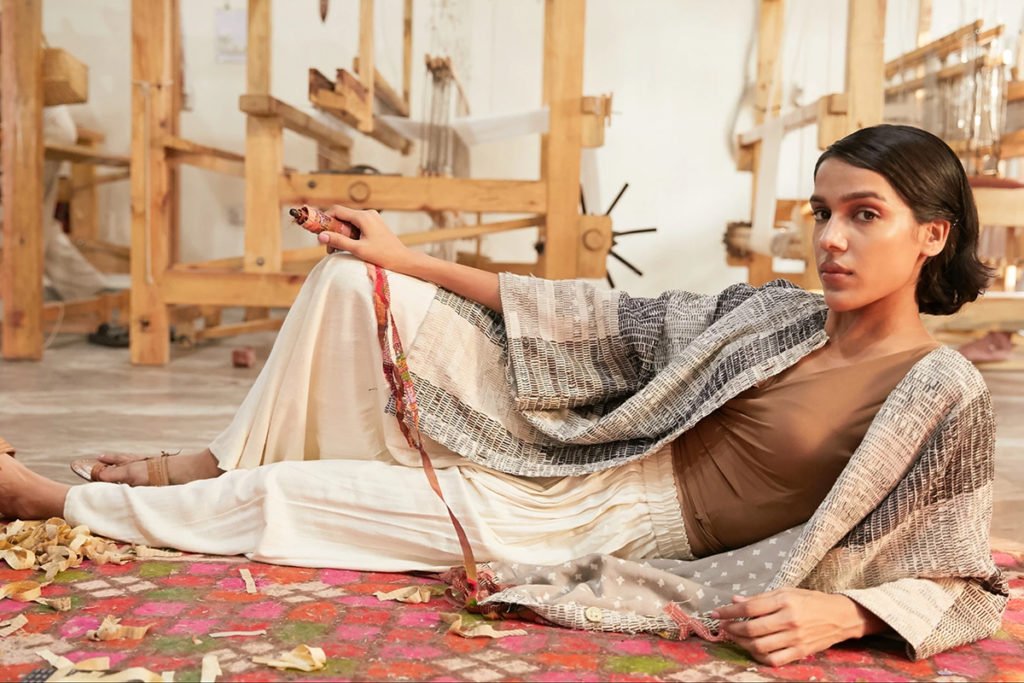One of the most delightful parts of the lively social media world also includes the space held by veganism, where a whole generation of voices flaunt their cooking smarts and plant-powered colour. One of our favourite voices on Instagram is Priyanka Naik, a self-taught Indian vegan chef, Food Network champion, Quibi Dishmantled winner, TV host, and author. She is a food and TV personality who hosts a clean-eating food show on Food Network’s The Kitchen and is the author of The Modern Tiffin, which will be out on November 2, 2021, available for pre-order now.
An avid traveller who’s been to nearly forty countries, her globally inspired original recipes, focusing on sustainability, has been featured on her blog Chef Priyanka and IGTV — hosting her own digital series Cook with Chef Pri at 3. She has garnered attention from and been featured on Glamour, The Today Show, Bon Appétit, CNN, Forbes, GQ, The Beet, Well and Good, Tenderly, and more. Alongside, she has partnered with several brands, including Coca-Cola, Amazon, and Uniqlo, for brand campaigns. Priyanka is a first-generation Indian American raised in Staten Island, New York, and has two elder sisters. Her Indian heritage is significant to her cooking style and lifestyle as she weaves in Indian elements throughout her original vegan cooking. She attributes her devotion to her Indian roots and passion for Indian food to her loving and supportive parents.
Here’s an exclusive interview with her about taking Indian cooking and cuisine to the next level; how she uses Instagram to spread positivity, educate people on her culture and raise awareness about sustainability while advising about switching to a plant-based lifestyle. Let her story motivate you to spark wonders in your kitchen with lots of plants and love.
According to you, how would you define your journey? When did you first decide to become a chef, and where did your career begin?
If I had to put it in one word, my journey has been typical. In American culture, most chefs have gone to culinary schools or did formal restaurant training, but in my case, I am self-taught, and I did not go to culinary school or work at a restaurant. My learning has been through my culture and family, especially my mom. I have always enjoyed cooking from a very young age. I would obsessively watch cooking shows as much as I watched cartoons. It’s always been my interest and passion. It wasn’t until high school, when I was 16 or 17, that I considered going to a culinary school. After doing research and getting accepted, I decided not to go because they make you cook and eat meat. I would not go against my philosophy of cooking. It was also costly. However, I went to Boston University. They focused only about three days or a week on Asian cuisine, but you could do a four-year culinary course in Indian regional cuisine alone. It just kind of rubs me the wrong way, so I decided not to go.
It’s been an upward battle because my background is not typical. So, that’s why I started my cooking blog 10 years ago. I started honing my talents and used them as a vehicle to educate others on how to cook not only vegetable-focused food but learn more about Indian culture through food that’s not restricted to just chicken tikka masala or garlic naan because that’s what is served as Indian food in many restaurants. I got onto Food Network, competed on a show, and I won, giving me a stepping stone to build credibility in the food space. I used it as a launching pad to work with brands, high-profile names, and brands.

For how long have you been living plant-based? Why did you choose veganism?
We are Maharashtrians, so our cooking is very vegetable-focused, which barely has any dairy either. Besides, I was a vegetarian my whole life except for my young adult years when I ate chicken and seafood because the options were limited in the States, especially in the ’90s and early 2000s. I cut meat, and animal-related food from my diet when I was 14 after watching 120 documentaries and researching. At my core, I was an animal lover and cared about the environment. So, if I really cared, why would I eat them when I didn’t like it anyway? About 5 or 6 years ago, I evolved into vegan-focused food and cooking all vegan. Again, I continued to research how the food industry and what we create affect the environment and our bodies. I do it mainly for environmental and ethical reasons. My focus now is vegan, sustainable, and zero-waste cooking and repurposing leftovers to not waste ingredients.
You are also very passionate about the environment. Can you talk to us about the environment and the health benefits of veganism and zero-waste cooking?
I am not a physician or a nutritionist, so nothing I say comes from a place of expertise. From my experience – from eating chicken to being a vegetarian to being vegan – there is a noticeable difference in my body, energy, and mental health. My skin and hair are a lot better. I am more productive because I am not being barged down with heavy, saturated fats, dairy, and meat.
From an environmental standpoint, it’s not only terrible for the Earth but also for the people. Especially in the States, there is a massive industry of factory farming. The methane produced by animals is detrimental to the environment and communities around. These factory farms in the middle of America and North Carolina have a lot of runoff and animal waste as it goes into the water. It is horrible for factory farming, not only for slaughterhouses but for dairy farming too.

We evolve out of the need for requiring dairy. We lose the enzyme to break down lactose as we get older, so many people become lactose intolerant. So, from that kind of evolutionary standpoint, it doesn’t even make sense to eat dairy. Besides, we don’t even have the jaw structure and teeth to break down the meat. From my experience, cutting that out makes me feel and look better. Most of the world, especially the west, is so reactionary in the medical and health approach. But if society was a bit more proactive and thought more about what they put into their bodies, it differs in how it manifests itself on the outside. I believe that Indian people and culture are good because many of our foods and approaches are ayurvedic, which says that many foods have healing properties. So, I take that into account when cooking and educating people about food.
Tell us more about your upbringing and how food played a role in your family and community? How does your Indian culture and heritage influence your cooking?
Culture influenced my cooking style and approach to putting vegetables first. I was born and raised in Staten Island, which is not diverse at all. It’s very homogenous, caucasian, very Italian, and eastern European. So, not many people looked like us, which led us to deal with discrimination and racism. When my mom made lunch for me to take to school, it would be very different from everyone else’s, leading to me being singled out. However, that actually drew me much closer to my culture. I saw a lot of comfort at home because I liked being Indian, the food, learning about it, and going to India. I felt that people on that island didn’t know enough about our culture, so they discriminated against it.

I grew up embracing our culture a lot and even more now, so it has a huge influence on how I cook while dismantling the notions that people have of Indian food. People in the States are like, “Oh! You guys must eat samosas and chicken tikka masala“, but no. So, I use my platform and my talent for cooking and educating people, which has been a tremendous driving force. The more people learn about different cultures in the States, the more they can open their minds, embrace it, and open up to more foods.
Your blog is filled with recipes from all around the world. What inspires your global vegan recipes? Where do you draw inspiration for your work?
There are three main places where my inspiration comes from. First is my culture. I travelled to India every single year of my life. Even my parents were very strict about learning from our culture. Second is my lifestyle, as I travel quite a bit. I have learned about how different cultures think about food, approach food, and agriculture, what they put on the plate. It has influenced the way I think about food and the various concepts I have for dishes. The third is my love for animals and the environment. I strive to challenge myself in thinking of creative vegan dishes and approach sustainability where I can use the entire product and not waste the tops of carrots or peels. So, I think these small details add up from a long-term sustainability standpoint.
You said you work on Twitter when you are not cooking up vegan recipes and managing your blog. How do you manage it all?
Yes, it’s a lot on my plate. I do manage two careers, but I would say it’s about time management. As you get older, you learn to focus on how you manage your energy. For me, a lot of that energy is controlled by working at Twitter and as a chef, which means I forgo many social parties and interactions. I am very picky about how I spend my time. Right now, it’s very critical for me to continue growing in my career and hopefully expand the blog. I am not married, and I don’t have kids because I want to use my time to manage everything else.

The cuisine has often been a great way to bridge the divide among different people. How are you using your passion for cooking as a way to spread positivity and awareness?
My approach to everything you see on the internet and even my book is the 3 ‘e’s – entertain, educate and empower. I always lead with entertaining because no one wants to see someone boring on the internet or tv. But through that entertainment, I am constantly educating – how to make a dish vegan, how to waste less, how to use spices and temper them, how to use fresh coriander or just coriander seeds, and much more. So, there’s always an element of education in my content and my approach to cooking food. The third is empowering because if you educate the masses, they should be empowered to do it independently. My mission as a chef is to get people to go into their kitchens, cook for themselves and their families, and feel empowered to do it. That’s the kind of hope that I have through my content and now my book.

What are some stereotypes about veganism that you want to dismantle forever?
That it’s gross; it’s salad; it’s boring; it’s like raw vegetables. It was not until last year that the word vegan had a negative connotation. People didn’t want to eat it, they don’t want to try vegan cheese, and it’s just coconut base and not anything weird. It wasn’t until the pandemic that people felt that they could embrace and learn about it while dismantling all the notions.
What are some strategies you think benefit people trying to become more plant-forward?
My advice to people is always to use dry spices, probably because I am an Indian and cook with many dry spices. It’s so easy to make vegetarian food if you just put stuff in it. If you use dry seasoning, it will expand your horizon by just flavouring food and thinking differently. So, I always advise people to use dry spices, have a mortar and pestle on hand, and make sure that you are approaching your food to balance all the flavours – sweet, spicy, bitter, and salty.
What can the readers expect from your upcoming cookbook ‘The Modern Tiffin’?

They will see a very vibrant vegetable-forward book and a proper combination of my life, which has an Indian heritage while travelling the world and bringing it together and sharing those recipes. These recipes are portioned for two people, so it’s very atypical of a traditional book. All the recipes can be made portable. So, it’s a ‘modern tiffin’. Moreover, there are illustrations and photography throughout, so it is very Indian-inspired with an ‘Alice in Wonderland feel.
- What do you eat in a day?
I generally start my day off with warm water and lemon, which helps remove toxins from the body and makes me feel good. I don’t particularly like eating breakfast, so my first meal of the day is generally around 1 PM and consists of leftovers from the previous evening’s dinner or a carb-heavy meal (noodles, pasta) with a ton of veggies – spicy and filling. Then I eat dinner around 7–8 PM. I either go out with friends or cook myself something like pearl couscous with sautéed greens, raw mango, red chilli, and tofu.
- Favorite restaurant?
This is a tough one because I love a ton of places. But I love Málà Project, which is a fabulous dry pot.
- Favorite vegan dish?
Another tricky question, but probably stuffed bendekai (okra) that my momma makes.
- An ingredient that you can’t live without
So many, but probably fresh coriander (cilantro). It has a unique flavour, beautiful colour and truly brings a wonderful freshness to dishes.
- Where do you usually shop for vegan ingredients?
Local grocery stores, farmer’s markets. All whole foods are vegan, i.e., fruits, vegetables, herbs, oils, lots of bread, etc.

- 5 tips for the millennials to inculcate healthy eating and cooking habits
- Think outside of the typical western plate of protein at the centre, carbs and vegetables on the side. Once that perspective is dismantled, your entire perspective on food and options is expanded.
- Eat whole foods instead of processed foods.
- Use dried spices.
- Shop more frequently at the grocery instead of buying in bulk – this minimizes food wastage.
- Only eat when you’re hungry.
What advice would you give someone who wants to go plant-based?
Experiment with a new vegetable every week and challenge yourself to make 4-5 different dishes with that vegetable throughout the week. This challenges your creativity and cooking skills and builds an entire library of recipes for you to use going forward. Besides, please use dried spices – coriander, cumin, fennel, dried red chillies, etc., as it goes a long way in flavouring your food.
This young face of the world of veganism wants everyone to treat every being as one would like to be treated. After all, everyone deserves respect, no matter how big or small!





